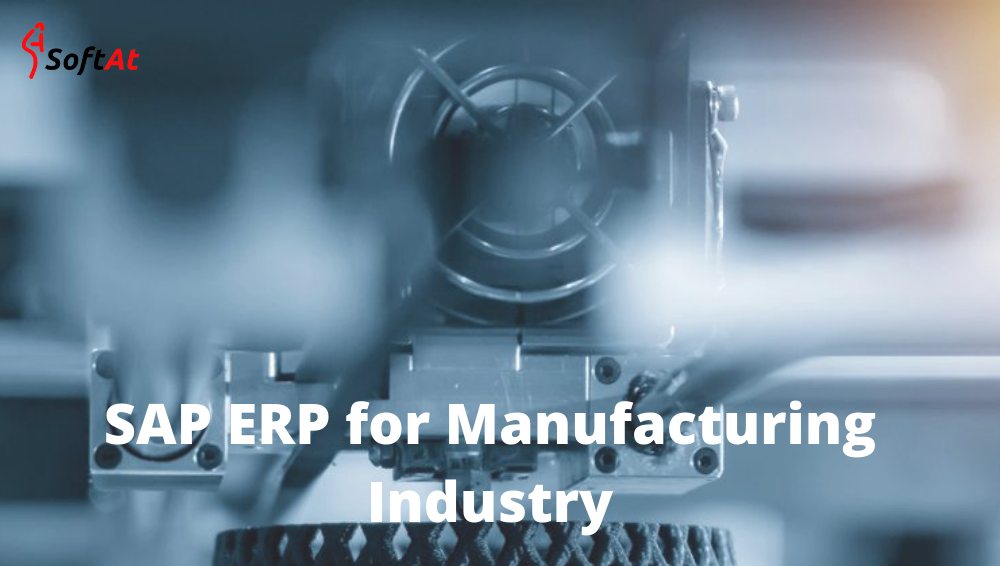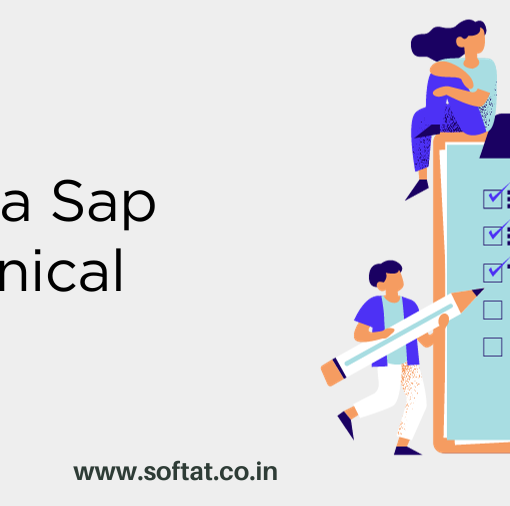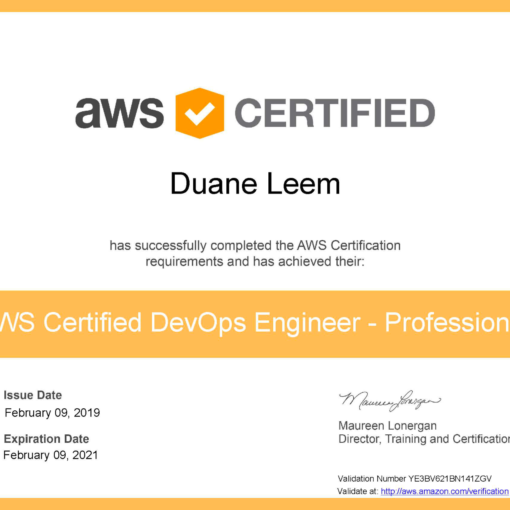
Technology is advancing rapidly, and forward-thinking manufacturers are embracing the digital revolution. SAP ERP For Manufacturing Industry are adopting new technologies in order to stay relevant, innovative and competitive. One of these important technologies is the use of SAP ERPs for the manufacturing industry. sap manufacturing modules
All manufacturers strive to optimize their operational processes by reducing costs, improving efficiency and increasing profits. Advancements in technology have aided many manufacturers in achieving these goals.
Failure to adopt new technologies in your manufacturing business will make it significantly harder for it to thrive and grow in today’s fast-paced, digital business environment.
SAP ERP
SAP was founded in 1972 by five former IBM engineers, and is one of the largest global vendors of Enterprise Resource Planning (ERP) software.
It offers industry-specific ERP solutions that support business processes across procurement, manufacturing, service, sales, finance and human resources.
SAP ERP solutions support the following manufacturing types:
- Discrete Manufacturing: A manufacturing process whereby finished products are distinct items capable of being easily counted, touched or seen. Discrete manufacturing involves parts like nuts and bolts, brackets, wires and individual products. Examples of products made by discrete manufacturing include furniture, toys and smartphones.
- Process Manufacturing: A process whereby a product is created by using a formula or recipe to refine the raw ingredients. The final product cannot be broken down into its basic components. Examples of products made by process manufacturing include pharmaceuticals, paint, food and beverages.
- Repetitive Manufacturing: In this process, goods are manufactured by following the same production sequences. This type of manufacturing process often goes hand-in-hand with automated assembly processes. Examples of products made by repetitive manufacturing include small electronic goods and car components.
SAP ERP Integrations
SAP ERP solutions integrate with the following systems:
- Salesforce
- Microsoft Dynamics
- Zoho CRM
- Oracle
- Sage
- NetSuite
SAP ERP’s for the Manufacturing Industry
SAP Business One
Designed for small and mid-size businesses, SAP Business One is an ERP solution that automates and streamlines key business functions in financials, operations and human resources. With SAP Business One, you will gain greater insight into your business, streamline key processes and make strategic decisions based on real-time information. SAP Business One can be deployed on cloud or on-premise and is integrated with business intelligence and the SAP HANA platform. (ERP for Manufacturing Industry)
Key Features of SAP Business One
SAP Business One is an integrated enterprise resource planning (ERP) solution designed specifically for small and medium-sized businesses (SMBs). It provides a comprehensive set of features and functionalities to manage various business processes. Here are some key features of SAP Business One:
Financial Management: SAP Business One offers robust financial management capabilities, including general ledger, accounts payable, accounts receivable, cash flow management, fixed asset management, budgeting, and financial reporting. It provides real-time visibility into financial data, enables accurate financial planning, and supports multi-currency transactions.
Sales and Customer Relationship Management (CRM): The solution enables businesses to manage the complete sales cycle, from lead generation to customer acquisition and retention. It includes features such as sales opportunity management, sales orders, quotations, pricing, customer management, and after-sales service. SAP Business One also integrates with Microsoft Outlook to streamline communication and manage customer interactions effectively.
Purchasing and Supplier Management: With SAP Business One, organizations can streamline their procurement processes. It offers functionalities for purchase orders, purchase requisitions, vendor management, pricing, inventory management, and goods receipt. The solution helps optimize procurement activities, track supplier performance, and improve inventory management.
Inventory Management: SAP Business One provides comprehensive inventory management capabilities, including real-time inventory tracking, warehouse management, bin location management, serial number management, batch management, and stock transfer. The solution helps optimize inventory levels, improve order fulfillment, and reduce carrying costs.
Manufacturing and Production Planning: For manufacturing businesses, SAP Business One offers features such as bill of materials (BOM), production orders, material requirements planning (MRP), capacity planning, and shop floor control. These functionalities help manage the complete production process, optimize resource allocation, and ensure timely delivery.
Reporting and Business Intelligence: SAP Business One includes built-in reporting and analytics tools that enable users to create customized reports, dashboards, and queries. It provides real-time insights into business performance, supports data-driven decision-making, and allows users to monitor key performance indicators (KPIs).
Integration and Extensibility: SAP Business One can be integrated with other SAP solutions, such as SAP Business Warehouse (BW) and SAP HANA, as well as with third-party applications. It also provides software development kits (SDKs) and integration frameworks that allow businesses to extend and customize the solution based on their specific needs.
Mobility and Remote Access: SAP Business One offers mobile applications that enable users to access the system and perform essential tasks on the go. Users can access sales data, customer information, and inventory details, and approve workflows through mobile devices, improving productivity and responsiveness.
These are some of the key features of SAP Business One. The solution aims to provide SMBs with an affordable and scalable ERP solution that integrates various business functions, streamlines processes, and helps drive business growth.
How Does ERP Help in Manufacturing?
ERP helps in manufacturing to automate the business processes from sales orders to finished goods. It manages inventory, controls production, provides orders and demand, and gives end-to-end visibility into the production process.
At Seidor, we have over 7000 customers running SAP solutions worldwide. When talking with executive managers from manufacturing companies, we consistently hear the same business needs they expect from manufacturing ERP software:
Manage Inventory and Bills of Material for Manufacturing
- Handle all types of bills of materials and multi-level bills of materials
- Incorporate landed costs for material coming from overseas
- Record, track, and produce serial and/or batch numbers for incoming and outgoing products
- Manage multiple units of measure
- Conduct materials planning, purchasing, and inventory forecasting projections within MRP
Manage the Production Process
- Manage production orders electronically
- Generate either an assembly or disassembly work order
- Record the usage of raw materials, resources and labor
- Generate finished goods
As a manufacturer grows, the business expands and drives additional needs or requirements. To speed warehouse operations they look for wireless, handheld devices that are integrated into inventory systems for use in the warehouse. To facilitate vendor orders and payments, they look for integration with EDI tools. To expedite outbound shipping they look for integration with major shipping service providers like UPS, FedEx and USPS. We have also seen requirements for advanced production scheduling, shop floor control, batch/lot management, WIP management and job costing.
The process to help you compare SAP ERP manufacturing solutions starts with understanding your place in the market now, and your vision for the future. We ask questions to understand your business size, manufacturing process, place within your industry, and where you want your business to be. Then we match your requirements, functions, users, and investment goals to the SAP solution set to select an appropriate platform.
We apply your business principles with those we have encountered across our customer base. Seidor has experience with providing ERP solutions within a number of manufacturing verticals, including automotive, chemicals, electronics, fabricated metals, food, furniture, lighting, machinery and equipment, and consumer goods just to name a few.
Know more about How is SAP used in Manufacturing
- SAP is considered to be a soulful software package covering all business entities within a single software package.
- Data about the utilization of resources are recorded inducing to analyze the demand for raw materials with ease.
- Accounts payable and receivable are maintained effortlessly by a valid financial management system since it gathers reports from every module.
- Daily production details are recorded enabling effective planning on a diversified process inconsistent manner.
- Efficient maintenance of inventories tracks the supply chain of furnished products allowing to generate demand-based production.
- The integrated solution promotes delivering quality products to customers. Pre-checking functionality exists before a product is delivered to an ordered person.
- Documents on overall processing are retained under a separate cloud database. The information available can be viewed by concerned organizational authorities whenever in need it.
- Customer relationships are greatly enhanced through the SAP software package. Sales representatives quickly respond to queries and orders from consumers to engage in long-term business deals.
- SAP software takes care of end to end processing in an automated approach avoiding disruptions from production to sales of finished products.
- It reduces time and amount spent in the manufacturing of varied products by skillful planning since it gets linked with every module.
- Software system supports for efficient implementation of resources and labor based on which firm process is done in the regulatory process.
- Feedback collected from customers helps manufacturers to upgrade areas of improvement. By doing so, the meeting of target people gets enriched.
- Records on entire functionalities maintained in a secured mechanism do not allow for third-party intruders to access information.
sap manufacturing modules
SAP offers a range of manufacturing modules within its ERP (Enterprise Resource Planning) system to help businesses effectively manage their manufacturing processes. Some of the key manufacturing modules provided by SAP include:
- SAP Production Planning (PP): This module assists in planning and controlling the production processes, including creating production orders, scheduling resources, managing bill of materials, and tracking production progress.
- SAP Material Management (MM): While not exclusively a manufacturing module, MM helps manage the procurement of materials, inventory management, and supplier relationships, which are crucial aspects of the manufacturing process.
- SAP Plant Maintenance (PM): This module supports the maintenance of manufacturing equipment and assets by enabling companies to schedule maintenance tasks, track equipment history, and manage maintenance resources.
- SAP Quality Management (QM): QM module ensures that manufacturing processes maintain the desired quality standards by defining quality control points, conducting inspections, managing quality certificates, and handling quality deviations.
- SAP Production Execution (PP-PI): This module focuses on managing the execution of production processes on the shop floor, including order processing, material movements, and real-time monitoring of production activities.
- SAP Advanced Planning and Optimization (APO): APO module aids in demand planning, supply network optimization, and production scheduling to achieve better alignment between production and demand.
- SAP Extended Warehouse Management (EWM): While not exclusively for manufacturing, EWM helps manage warehouse operations efficiently, which is critical for storing and distributing manufactured goods.
- SAP Manufacturing Integration and Intelligence (MII): MII module provides real-time visibility into manufacturing operations by integrating production data from various sources, enabling better decision-making and process optimization.
- SAP Overall Equipment Effectiveness (OEE): This module measures the efficiency and effectiveness of manufacturing equipment to identify areas for improvement and optimize production performance.
- SAP Product Lifecycle Management (PLM): PLM supports the entire product lifecycle, from design and development to manufacturing and maintenance, ensuring seamless collaboration across departments.
These modules are part of the broader SAP ERP system and can be customized and integrated to meet the specific needs of manufacturing businesses, helping them achieve operational efficiency, reduce costs, and maintain product quality. sap manufacturing modules
conclusion of SAP ERP for the Manufacturing Industry
In conclusion, SAP ERP is a powerful solution for the manufacturing industry, offering a comprehensive set of features and functionalities to streamline and optimize business processes. By implementing SAP ERP, manufacturing organizations can achieve greater operational efficiency, improved visibility into their operations, and enhanced decision-making capabilities. The financial management capabilities of SAP ERP enable accurate cost tracking, budgeting, and financial planning, ensuring sound financial management.
SAP ERP for Manufacturing Industry





